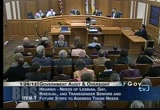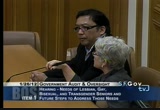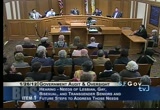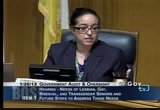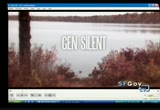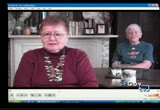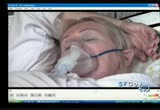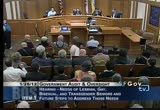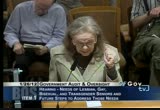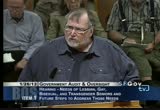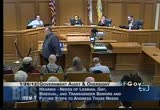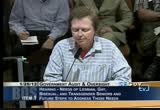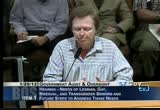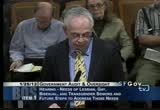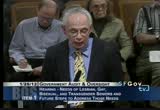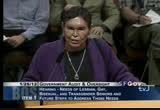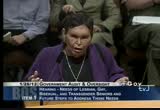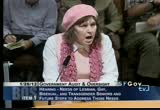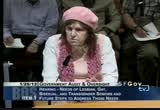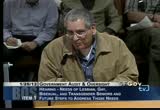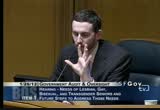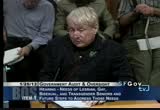tv [untitled] January 30, 2012 10:18pm-10:48pm PST
10:18 pm
and to the extent that is the case, what kind of oversight does the department provide to make sure that it is appropriate? >> yes, but that is part of the requirement of our providers. we also have business office compliance that monitors the procedures that require it that to be implemented. we do have a monitoring unit that does that. specific to the goals of cultural competency for the lgbt population, we have had those kinds of trainings within the department of public health. i think probably one weakness is the intersection between older adults and lgbt issues, because
10:19 pm
of those. we are committed to training. aside from dedicated funding for organizations that serve dedicated populations, we really want our whole system to be able to surerve clients anywhere they show up. we also place a value on training, as well as actually hiring culturally competent staff. >> when we first had our contract with open house, we sent letters to all of our contractors to strongly encourage them to do this. the idea was to see what would come from that. if we did not get everybody, then we would do something else. we were pleasantly surprised at the number of organizations that signed on to the training and you asked for further training, and that includes organizations that we thought, given the history, probably would not do that.
10:20 pm
i think, as seth says, the demand has been there. supervisor campos: i think that is wonderful. i think we should do more than just strong liking courage, and we should require people to provide that if they're going to get city funding, and also check with the people who are benefiting from the service to make sure that we feel they're being treated well. >> i think there is potential to do that within the department of public health. we are reported the contracts that contractors have american health equity disparities, the history of the african-american community, that is the first time that it was ever required to have specific training. supervisor olague: along the lines of what supervisors wiener and campos were saying, it seems
10:21 pm
that we couldn't work with the department of aging and adult services and actually provide a series of training for all of those agencies that are receiving funding. it was useful for us that we had a series of training from the transgender lost institute, and they came in and give us some training, and it was informative and useful. i think definitely health-care providers should be included in this, but beyond that, it should just be folks who are receiving money through daas to deal with the public. maybe as supervisor campos said, there is a way of mandating that, but it is certainly something to look at. >> we can mandated at dph. supervisor wiener: thank you. we are about to get to public
10:22 pm
comment. first, we have a three-minute video, and then we will get right into public comment. supervisor farrell: just to remind everyone, we do have an overflow room, room 250, for those of those -- for those of you who are standing. if you want to go to the overflow room. ok, we're getting filled up. also, for those of you who want to speak, please fill out your public comment cards. let me just call a few names so that we can get it started before. bill, you'll be first, public comment afterward, marcy, bill hersh, every bush, and betty trainer. la --rry bush, and betty trainer. >> i am just supposed to warn the people in the book that we are about to play a video. -- and the peoplein the booth
10:23 pm
10:24 pm
having the elder. , asking for forgiveness. >> and to be cured, it is not too late to be cared. they go back into the closet. >> they're resisting any kind of medical attention. >> a person within their mid-20s during the mccarthy era -- >> that could lose their job, they could lose their families. >> people were involuntarily hospitalize to its psychiatric facilities. >> electroshock. >> their satisfaction, and being tortured themselves. >> there is a real distrust of mainstream institutions. >> i would never put myself in danger. >> much more fearful of people
10:25 pm
knowing that we were gay. ♪ >> lgbt elders are more likely than the general population's to age along, because many never had children and have not had great relationships with their family of origin. there would be a higher degree of alienation and isolation. >> my family was the reason i existed, and i lost them all. if they ever choose to catch up before i die, i welcome them. >> lgbt aging issues are an epidemic. there is a small and growing group of us. >> we're trying to go into existing networks so they become more inclusion. one of the common things we get is, like, we do not have any gay
10:26 pm
elders here. >> i would have ended my life. >> this is our life. ♪ >> we have a whole generation of people who do not know who we are. that is really sad, because you're missing out on a lot. we know a lot. we did a lot for you. you would not be here if it were not for us. >> look at house scrawny they are. -- look at how scrawny they are. >> we are seeing come out and be filled with pride. it is our responsibility to make sure that continues right through their last days.
10:27 pm
♪ supervisor wiener: thank you very much. before public comment, we have the rules committee which is starting up right now, and we will be talking about bringing choice of voting. which i am sure will be a brief conversation. so supervisor campos and supervisor farrell: have had it over there. there on that committee. and president chiu has joined us. i have an item at rules, and i will have to pop out briefly. if you see the musical chairs, just so you understand what is happening. supervisor farrell had already called a few names. let me call a few more. the rules for public comment, you receive two minutes.
10:28 pm
when you have 30 seconds left, you'll hear is off to bell. at two minutes, you'll hear a louder bell. at that point, quickly wind up so we can keep moving. if people would line up, the next person will quickly come up to the podium. in addition to the folks that supervisor farrell called, i will call camille, felicia, nickie, gustavo, maggie, lynn, jessie, and pamela. previously, supervisor farrell called bill, marcie, bill, isaac, and betty. you do not have to come up in
10:29 pm
any order. maybe lineup on that side. any of the names, does not matter if you are in the exact order. maggie, you can start if you want. >> thank you. very generous of you. well, i have a lot to say, and i am going to try to say it in two minutes. i am a native san franciscan, 81 years old. i grew up in the castro peter i am bisexual. i have two children who are grown, in their 50s, and a granddaughter who is 12 and is brilliant. i have a history as a registered nurse, a psychotherapist, and sexologist. i am very fortunate. i bought my house in the 1960's. i bought it for $16,000. a lovely little house in glen park. it has no stairs inside, no stairs from the street.
10:30 pm
as a very lucky. but i live alone. i have a cat. my kids come over a lot of my friends come over a lot. and i go out and do stuff. i am longtime member of harvey milk since the beginning. i knew harvey will. harvey milk is putting on an lgbt elders forum in march, march 24. i just wanted to focus on so many issues, particularly on housing, which was so brilliantly discussed here, homelessness issues, aids issues, on a safety and health care and independence issues, particularly housing. i have friends and younger than me who have been waiting for years. [bell rings] i want to say one more thing, i was on the advisory board at new lease for 11 years before it closed.
10:31 pm
so i am lucky. my help is good at 81. i do not know how it will be later on. but i cry, and my heart breaks for all those people out there who do not have the good fortune that i have. and i urge the board, and i thank you for listening to me, that we take immediate action. not years later action, on this. thank you very much. supervisor wiener: thank you. mr. bosch, my other constituent. >> thank you. i am larry burch. for 1985 to 1990 -- to 2000, -- to 2010, as a public affairs office for the department of housing and urban development. one out of 10 families in san francisco lives in housing that is funded in part by hud. in 2000, might then boss tried to work on open house to see what could be done. eight years where nothing was
10:32 pm
done. but with the new administration that came in with the new assistant secretary, a great deal of progress has been made, particularly on the issues of lgbt seniors. it needs hearings like yours to establish a documentary record of what has to be done. when weaver started working with washington on this issue, i was able to go to the national center for lesbian rights and to the city's human rights commission, and they were the best resources in the country for what was going on, and they do not have as much as we needed. the record has been built since that time. the records show that it is more than just hud that is involved. the comfort level in the bureaucracy is not as great as it used to be. when i pushed, for example, about defining families as broadly as possible in public housing or defining the ability of same-sex couples to buy an fha-secured home, i was actually a disciplined and suspended for
10:33 pm
some time. it had to be overruled. those things are not part of our policy. but i would recommend that the committee consider asking for a document to be developed of rights and resources for lgbt seniors, because it is not just in hud but also in hhs and other agencies, and there needs to be a coordinated function from the local level to push the federal level. thank you. supervisor wiener: thank you. next speaker. >> hello, my name is betty, and i am a board member at senior action network. thank you very much for having this hearing, which is very important. as supervisor olague mentioned, prior to being called to duty by the mayor, she was a staff person that senior action network. in fact, she was our program manager for housing advocacy. and i know, i pretty clear for seniors and persons with disabilities, i know how
10:34 pm
frustrated she was, as well as the rest of us, when people would come in and call and ask about low-income housing, and all we could do was show them a list so that they could be put on a waiting list. the key word being waiting. it is not easy when you are a senior and you really need housing, particularly as people that we spoke to prior and as this film show, the vulnerability of lgbt seniors in looking for housing. the other issue we have recently been taking up, and again, when supervisor olague was with senior action network, she lit our program for seniors and persons with disabilities at sro hotels, a senior residence the occupancy hotels. many of those are in very poor condition. i do not know if you are aware that many of them do not have elevators. so seniors who, maybe when they were young, it was good exercise going up six or seven floors,
10:35 pm
but not so good when you're 70 and 80. and lgbt seniors are vulnerable in those situations, concerned about safety and being alone and isolated in an sro hotel. we have a working group that we started, because we had a hearing on this very subject, seniors at sro's in november. so we have a working group. i think it would be great to take up what she mentioned, combining our working groups. maybe one will come out of this hearing. so that we can work together on this, an issue. thank you. supervisor wiener: thank you very much. next speaker. >> good afternoon. my name is gustavo, vice president of the san francisco commission on aging and adult services. i was previously president and believe i am the first openly gay man to serve on it. thank you for allowing me to
10:36 pm
speak regarding this very important issue. the only alternatives to growing old are dying young or prematurely. those alternatives are no longer an option for me. many issues that lgbt seniors now face or will be dealing with are similar to what heterosexual seniors face. declining help, loss of independence, growing isolation. for many lgbt seniors who came of age before the gay liberation movement, those issues are compounded by a fear of revealing their sexual orientation, estrangement from their biological families, having outlived their friends, and medical and psychological issues that resulted in living in a huff of mixed society. it is likely that a number of seniors fitting that description has been undercounted. this may be a great issue among racial and ethnic minorities who face other discriminations from society. for lgbt folks, those of us that are in the avant-garde baby
10:37 pm
boomers to these issues may not be as great. for more of us have lived openly. far more of us have loving, accepting, and supportive families. far more of us have a broad social network, which includes families of choice. i am among the lucky ones, but this is not true for all of my contemporaries. i am not a statistician. but i feel that our numbers have been undercounted. we cannot plan effectively for the issues our community is facing and those we will be facing without knowing how many of us there are. once we know, we can plan accordingly and provide a range of options so we can have a dignified old age as possible. thank you. supervisor wiener: thank you. next. >> hello, thank you for having me. i always open up wherever i go to let you know i am 8 screaming queen. i am is a pioneer. i am a legend could i am an
10:38 pm
icon. and i am a diva. [laughter] [applause] i am -- i came to san francisco when i was 15 years old. i was gay, fairy, queen, transgender, a female impersonator, a prostitute. and i was in the cafeteria rights it would get lost for 40 years until susan striker came and saw the documentary, and she won an emmy for it. i have been fighting ever since. i was fighting in the 1960's. and i am fighting now for the seniors. i might not see this housing in my lifetime, but i am fighting for the future of lgbt, like i did in the 1966 riot. my family does not accept me, which is ok. i have two dogs.
10:39 pm
they are very accepting of me. [laughter] and i love them to death. i could sugar coated, what it is to be a transsexual, because i can pass. nobody knows who i am in the straight world. but in the lgbt community, there's a lot of discrimination to transgendered people. because they assume what they do not want to assume, who we are. and one more thing, supervisor chiu, this is directly to you. i gave you a document of the 1966 cafeteria riot in august of last year, because we were celebrating our 40th anniversary. and i never heard anything about that. no confirmation of that or anything that you received it or anything like that. i gave one to mark leno, tom
10:40 pm
amiano, and devon duffy, and i heard from all of them, except for from the board. i gave it to the board because there is a lot of gay supervisors, but i gave it to the president, because i wanted to make sure that our lgbt history is never forgotten and that the transgender, the hair fairy, the queens, the hustlers are the ones in 1966 that began the san francisco gay movement. thank you. [applause] supervisor chiu: ma'am, i just want to say, i loved -- i will love to get another copy. i do not remember ever receiving that, but i would love to take a look at it. thank you. supervisor wiener: thank you. ms. moran. >> hello.
10:41 pm
i am camille. i was born a permanent trend sexual child, and i am going to die feminine transsexual. but i do not want to die the way i was -- i do not want my life to end the way it began. excuse me. i think that that kinship, what has been talked about, is really important, and i hope you make it along. the way lgbt people were treated before aids, before condoms, before anything, it could have put -- and makes it look like kindergarten. electric shock, insulin shock,
10:42 pm
thursday niehaus -- every torture they could event, they give to lgbt people, from children to seniors. i am worried about lgbt seniors been part of what is happening to seniors in general. hundreds of thousands of seniors have parkinson's and other diseases from having thorazine and other drugs forced down their throats. 90% of people who get electroshock treatments are seniors, mostly women. [bell rings] that is not independent living. that is not human dignity. i am sorry, that video made me not very steady today.
10:43 pm
i hope we get housing and health care that does not discriminate. i hope we get health care that is not a disguise for torturing us again. so thank you. [applause] supervisor wiener: thank you. next speaker. >> good afternoon. my name is sneaky. i came up here from southern california. it was supposed to be my partner, and his name was in it. but we live in a community with that was a very conservative area, and we faced discrimination. he was sick. when he got worse, i cannot visit him in the hospital. when i said he was my partner, they had no idea what that meant. before he passed away, he made me promise to go to san francisco, because we were going
10:44 pm
to retire up here together. we wanted to hold hands appeared in together. we never got to do that, because he passed away. he passed away. i sold my house. i came up here. i started crying because i saw the outline of the city. i said, oh, my god, there is the emerald city. it has been good to me, the city. but i see some of my peers adjusting to the living situation here are being pushed out of their apartment, and we discuss it at coffee time. it is amazing to see that, then nothing is being done for them. but the house was discovered. we go to meetings. we have groups. i would like to see publicity on the city part when they do tourist commercials kucinich san francisco is lgbt friendly. come to san francisco. i did volunteer for the training program with open house, and the main thing i noticed, they know
10:45 pm
-- they had no idea they had lgbt clients in their facility. when i spoke in told him why we went into the closet, they understood. i told them, go to the store and get a pin in the castro, where it, and i imagine that is working out. but it is needed, the training. it is needed. thank you. [applause] supervisor wiener: thank you very much. and we do have the board rule in terms of not having clapping or booing, because it does disrupt the flow. i know we're all very enthusiastic about a lot of the speakers, but if you can refrain from clapping, we appreciate it. next speaker. >> my name is lynn. i have been in san francisco m0a metropolitan community church in
10:46 pm
1970. working with open house and their caring connection friendly visitor program. what supervisor wiener said about concerns about aids is germane to our church, even though we have an increasing number of lgbt seniors, even though over 500 members of our church died of aids. one of the topics of discussion around this was the concerns expressed about the cartel's -- cocktails and the presence of the virus that might be accelerating the aging process of some of our church members. they are experiencing memory loss, fatigue, loss of mobility. they're only in their 50's at into their 60's. seniors are experiencing the challenges of negotiating a multi-tier insurance provider, reductions in home support services, eligibility for medications, medical follow ups, all of this because of medical facilities -- also do not have
10:47 pm
special assessments for seniors in these facilities. we now require the resources of the declining number of organizations, such as open house san francisco, to act as our advocate for housing, medical treatment, mental health issues, and support in social services. i have lost nearly all of my peer support group, and i am estranged from my family. the dilemma is also for what constitutes affordable housing. for all of us, there is no model, especially for lgbt seniors, especially those living with hiv/aids and what the future holds for us. thank you. supervisor wiener: thank you very much. next speaker. >> good morning, good afternoon peter i am pam. i am 55. and i love my city
267 Views
IN COLLECTIONS
SFGTV: San Francisco Government Television Television Archive
Television Archive  Television Archive News Search Service
Television Archive News Search Service 
Uploaded by TV Archive on

 Live Music Archive
Live Music Archive Librivox Free Audio
Librivox Free Audio Metropolitan Museum
Metropolitan Museum Cleveland Museum of Art
Cleveland Museum of Art Internet Arcade
Internet Arcade Console Living Room
Console Living Room Books to Borrow
Books to Borrow Open Library
Open Library TV News
TV News Understanding 9/11
Understanding 9/11